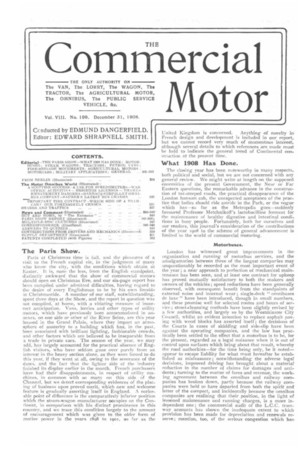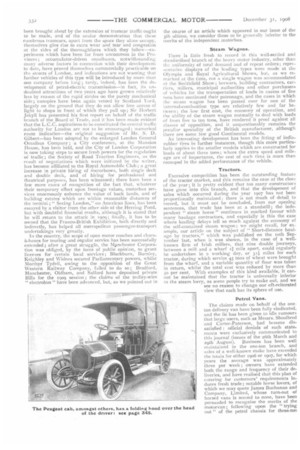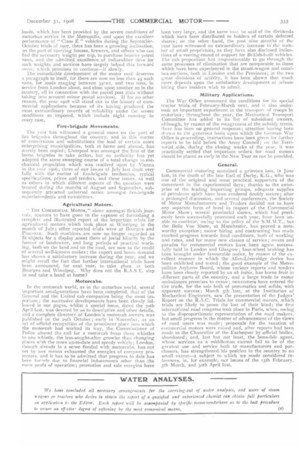Motorbuses.
Page 1

Page 2

Page 3

If you've noticed an error in this article please click here to report it so we can fix it.
London has witnessed great improvements in the organisation and running of motorbus services, and the amalgamation between three of the largest cornparies may unquestionably be recorded as the most important event of the year; a near approach to perfection of mechanical maintenance has been seen, and at least one contract for upkeep has proved mutually satisfactory to both the makers and owners of the vehicles ; speed reductions have been generally observed, with consequent benefit from the standpoints of external noise and internal wear; single-deck " omnibuses de luxe" have been introduced, though in small numbers, and these promise well for selected routes and hours of service; street-cleansing methods have been slightly revised by a few authorities, and largely so by the Westminster City Council, whilst an evident intention to replace asphalt paving with wood blocks has asserted itself ; the decisions of the Courts in cases of skidding and side-slip have been against the operating companies, and the law has practically been settled to the effect that a motorbus is to be, for the present, regarded as a legal nuisance when it is out of control upon surfaces which bring about that result, whereby the road authorities—for the time being only, be it noted— appear to escape liability for what must hereafter be established as misfeasance; notwithstanding the adverse leg-at decisions, improved driving has brought about a material reduction in the number of claims for damages and accidents; turning to the matter of fares and revenue, the working agreement between the omnibus and railway companies has broken down, partly because the railway companies were held to have departed from both the spirit and letter of the compact, and incidentally because the omnibus companies are realising that their position, in the light of lessened maintenance and running charges, is a more independent one; the commercial audit of the L.C.C. tramway accounts has shown the inadequate extent to which provision has been made for depreciation and renewals reserve; mention, too, of the serious congestion which has:
been brought about by the extension of tramcar traffic ought to be made, and of the ocular demonstration that these cumbrous tramcars, apart from the space they alone occupy, themselves give rise to extra wear and tear and congestion at the sides of the thoroughfares which they follow—experiences which have been far from uncommon in the Provinces; accumulator-driven omnibuses, notwithstanding many adverse factors in connection with their development to date, have proved themselves commercially practicable on the streets of London, and indications are not wanting that further vehicles of this type will be introduced by more than one company before long ; tardy, indeed, has been the development of petrol-electric transmission—in fact, its undoubted attractions of two years ago have grown relatively less by reason of the rapid strides on the purely mechanical side ; canopies have been again vetoed by Scotland lard, largely on the ground that they do not allow free access of light to shops in front of which they pull up; Sir Herbert Jekyll has presented his first report on behalf of the traffic branch of the Board of Trade, and it has been made evident that the L.C.C. aspirations to be constituted the central traffic authority for London arc not to be encouraged; numerical route indication—the original suggestion of Mr. S. D. Gilbert—has been adopted by the enlarged London General Omnibus Company ; a City conference, at the Mansion House, has been held, and the City of London Corporation is now taking steps to secure fresh powers for the regulation of traffic; the Society of Road Traction Engineers, as the result of negotiations which were initiated by the writer, has become affiliated to the Royal Automobile Club; a great increase in private hiring of motorbuses, both single deck and double deck, and of hiring for professional and theatrical purposes, has been witnessed ; there have been a few more cases of recognition of the fact that, whatever their temporary effect upon frontage values, motorbus services enormously enhance the value of back lands, and of building estates which are within reasonable distances of the termini ; " Seeing London," on American lines, has been -essayed by a visitor from the other side of the Herring Pond, but with doubtful financial results, although it is stated that he will return to the attack in tooe; finally, it has to be owned that the Franco-British Exhibition, both directly and indirectly, has helped all metropolitan passenger-transport undertakings very greatly.
In the country, the scope of open motor coaches and charsii-bancs for touring and regular service has been successfully extended; after a great struggle, the Manchester Corporation was obliged, by the force of public opinion, to grant licenses for certain local services ; Blackburn, Burnley, Keighley and Widnes secured Parliamentary powers, whilst Merthyr Tydvil, owing to the opposition of the Great Western Railway Company, failed to do so; Bradford, Manchester, Oldham, and Salford have deposited private Bills for the teoe session ; the claims of the trolley-wire " electrobus " have been advanced, but, as we pointed out in the course of an article which appeared in our issue of the sth ultimo, we consider these to be generally inferior to the merits of the independent motorbus.
Steam Wagons.
There is little fresh to record in this well-settled and standardised branch of the heavy motor industry, other than die uniformity of total demand and of repeat orders; representative displays of the leading types were made at the Olympia and Royal Agricultural Shows, but, as we remarked at the time, not a single wagon was accommodated rit the Smithfield Show ; brewers, building contractors, carriers, millers, municipal authorities and other purchasers of vehicles for the transportation of loads in excess of five tons have continued their patronage, and the cases in which the steam wagon has been passed over for one of the internal-combustion type are relatively few and far between ; the low first cost, the economy of operation, and the ability of the steam wagon normally to deal with loads of from five to ten tons, have rendered it proof against all classes of opposition, and it unquestionably remains the peculiar speciality of the British manufacturer, although there are some few good Continental models. An interesting development has been the fitting of Indiarubber tires in further instances, though this more particularly applies to the smaller models which are constructed for loads of about three tons; where the extra speed and mileage are of importance, the cost of such tires is more than recouped in the added performance of the vehicle.
Tractors.
Excessive competition has been the outstanding feature of the tractor market, and this remains the case at the close of the year ; it is pretty evident that too many constructors have gone into this branch, and that the development of sales which occurred during the year 1e07 has not been proportionally maintained; there is not much of detail to record, but it must not be concluded, from our opening sentences, that trade has been at a standstill; the independent " steam horse" continues in marked favour with many haulage contractors, and especially is this the case where loading delays tell so much against the economy of the self-contained steam wagon; we might recall, for example, our article on the subject of " Short-distance haulage by tractors," which was published on the loth September last, when it was shown, in the case of a wellknown firm of Irish millers, that nine double journeys, between a mill and a wharf q. mile apart, could regularly be undertaken in a working day, or 311 miles for each tractor, during which service 45 tons of wheat were brought from the wharf, and a variable quantity of flour was taken in return, whilst the total cost was reduced by more fhan 50 per cent. With examples of this kind available, it cannot be maintained that the tractor is universally inferior to the steam lorry, as some people try to make out, and we see no reason to change our oft-reiterated view that each has its sphere of use.
Petrol Vans.
The claims made on behalf of the oneton delivery van have been fully vindicated, and the lie has been given to idle rumours that large users, such as Messrs. Shoolbred and Carter-Paterson, had become dissatisfied: official denials of such statements were exclusively communicated to this journal (issues of the 26th March and 29th August). Business has been well maintained in the one-ton branch, and sales of a well-known make have exceeded the totals for either 1906 or 1907, for which years the average was approximately three per week ; owners have extended both the range and frequency of their deliveries, and have realised that this plan of catering for customers' requirements induces fresh trade; notable horse lovers, of which we may quote James Buchanan and Company, Limited, whose turn-out of horsed vans is second to none, have been persuaded to recognise the merits of the motorvan ; following upon the "trying out " of the petrol chassis for three-ten
loads, which has been provided by the severe conditions of motorbus service in the Metropolis, and upon the excellent performance of " Class E " vehicles during the SeptemberOctober trials of 1907, there has been a growing inclination, on the part of carrying houses, brewers, and others who can find the necessary weight per trip, to purchase heavier petrol vans, and the admitted excellence of indiarubber tires for such weights and services have largely helped this forward move, which promises to continue—if slowly.
The remarkable development of the motor mail deserves a paragraph to itself, for there are now no less than 45 such vans, for loads ranging between 35cw1. and two Ions, in service from London alone, and close upon another zo in the country, all in connection with the parcel post (this without taking into account minor postal services). If for no other reason, the year 1908 will stand out in the history of commercial applications because of its having produced the most extraordinary records of reliability under the severe conditions so imposed, which include night running in every case.
Fire-brigade Movements.
The year has witnessed a general move on the part of fire brigades throughout the country, and in this matter of conversions and substitutions the lead of certain more enterprising municipalities, both at borne and abroad, has merely been copied; Liverpool was amongst the first of the home brigades to take action, but no authority has yet adopted the same sweeping course of a total change to mechanical propulsion which was resolved upon by Vienna in the year 1906; three of our issues of July last dealt very fully with the matter of fire-brigade tendencies, typical specifications, prices and tenders, and these issues, as well as others in which different aspects of the question were treated during the months of August and September, subsequently attracted universal notice amongst fire-brigade superintendents and committees.
Agricultural Motors.
" THE COMMERCIAL MOTOR," alone amongst British journals, appears to have gone to the expense of furnishing a complete and illustrated report of the important trials for agricultural motors which took place at Winnipeg in the month of July; other reported trials were at Bourges and Piacenza. Such machines are now no longer regarded as fit objects for a display anent them of jovial hilarity by the farmer or landowner, and long periods of practical working, both on the land and on the road, are now to the credit of several well-known makes; the export and -home demand has shown a satisfactory increase during the year, and we might recall the fact that further international trials have been announced, for next year, to take place at both Bourges and Winnipeg. Why does not the R.A.S.E. step in and take a hand at home?
Motorcabs.
In the motorcab world, as in the motorbus world, several important amalgamations have been completed, that of the General and the United cab companies being the most important; the successive developments have been closely followed in our pages, whilst a special issue, dated the 3oth April last, was devoted by us to descriptive and other details, and a complete directory of London's motorcab owners was published on the 29th October; early in November, as an act of official recognition of the prominent place into which the motoreab had worked its way, the Commissioner of Police altered the call for a motoreab from three whistles to one whistle, the less-sought-after growler thus changing places with the more up-to-date and speedy vehicle; London, though already in a sense flooded with motorcabs, has not yet by any means exhausted the energies of company promoters, and it has to be admitted that progress to date has been !nosely due to financial inducements other than the mere profit of operation; promotion and sale margins have
been very large, and the same may be said of the dividends which have been distributed to holders of certain deferred shares ; on .the other hand, the past nine months of the year have witnessed an extraordinary increase in the number of snail proprietors, as they have also disclosed indications of a veering-round of support for British-built vehicles. The cab proposition has unquestionably to go through the same processes of elimination that are comparable to those which have been experienced in the steam-wagon and omnibus sections, both in London and the Provinces; in the two great divisions of activity, it has been shown that much more depends upon the satisfactory development of private hiring than insiders wish to admit.
Military Applications.
The War Office announced the conditions for its special tractor trials of February-March next, and it also undertook an important experiment in the transport of troops by motorbus; throughout the year, the Mechanical Transport Committee has added to its list of subsidised owners, although, by reason of the meagreness of the subsidy terms, there has been no general response; attention having been drawn to the generous basis upon which the German War Office is proceeding, instructions have been given for further reports to be laid before the Army Council; on the Territorial side, during the closing weeks of the year, it was practically settled that important orders for road motors should be placed as early in the New Year as can be provided,
General.
Commercial motoring sustained a grievous loss, in June last, in the death of the late Earl of Derby, K.G., who was one of the original and most practical supporters of the movement in the experimental days; thanks to the enterprise of the leading importing groups, adequate supplies of petroleum spirit have been rendered doubly secure; after a prolonged discussion, and several conferences, the Society of Motor Manufacturers and Traders decided not to have any separate form of bond in respect of the Commercial Motor Show ; several provincial shows, which had previously been successfully promoted each year, have been unable to continue, owing to the policy of the S.M.M.T., but the Belle Vue Show, at Manchester, has proved a noteworthy exception ; motor hiring and contracting has made marked progress towards final conditions, both of working and rates, and for many new classes of service ; meets and parades for commercial motors have been again successfully held in London and Glasgow; four-wheel braking has been brought under favourable notice, by reason of the excellent manner in which the Allen-Liversidge device has been exhibited and tested; the good example of the Metropolitan Asylums Board, whose various reports and tenders have been closely reported by us ab initio, has borne fruit in different parts of the country, and a large trade in motor ambulances promises to ensue; newcomers have entered the Lire trade, for the sale both of pneumatics and solids, with apparent success; March sth last, at the Institution of Mechanical Engineers, saw the presentation of the Judges' Report on the R.A.C. Trials for commercial motors, which trials are likely to prove the last of their kind; the first international road congress took place in Paris, when, owing to the disproportionate representation of the road makers, but small progress in the matter of advancement of the views of road users was made; proposals for the taxation of commercial motors were raised and, after reports had been made to the Chancellor of the Exchequer by official bodies, abandoned ; arid, last but not least, the bona-fide agent, whose services as a middleman cannot fail to be of the greatest use and service both to manufacturers and purchasers, has strengthened his position in the country to no small extent—a subject to which we made considered references, in, for example, our issues of the r3th February, sth March, and 3oth April last.






















